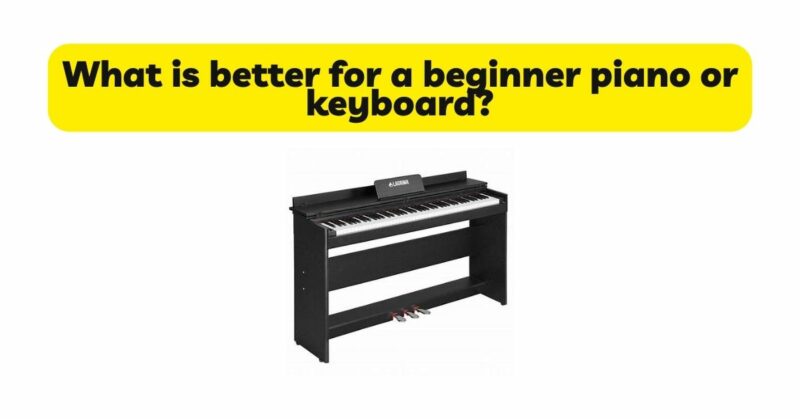Embarking on the journey of learning to play the piano is an exciting and fulfilling endeavor. As a beginner, one of the crucial decisions to make is whether to start learning on a piano or a keyboard. In this article, we will explore the factors to consider when choosing between these two options. By examining the advantages, considerations, and suitability for beginner pianists, we aim to provide insights that will help you make an informed decision based on your needs, preferences, and goals.
- Accessibility and Affordability: For many beginner pianists, accessibility and affordability are key considerations. Keyboards are generally more accessible and affordable compared to pianos. Keyboards are compact, lightweight, and portable, allowing for easy transportation and storage. They are often more affordable, making them a suitable choice for individuals who are just starting their musical journey or have budget constraints. On the other hand, pianos, particularly acoustic pianos, are larger, heavier, and require a dedicated space. They can be more expensive to purchase and maintain. Consider your available space and budget when deciding which instrument is more suitable for you as a beginner.
- Learning Tools and Resources: Both pianos and keyboards offer a variety of learning tools and resources to support beginner pianists. Keyboards often come with built-in tutorials, learning modes, and interactive features that guide learners through the fundamentals of piano playing. These features provide step-by-step instructions, practice exercises, and even visual aids to facilitate learning. Pianos, while lacking built-in features, offer a wide range of external resources such as books, online tutorials, and instructional videos that cater to beginner pianists. Consider the availability and suitability of learning resources for each instrument when making your choice.
- Key Action and Touch Sensitivity: Key action and touch sensitivity play a significant role in the playing experience and technique development. Acoustic pianos, with their weighted keys and mechanical action, provide a more authentic and responsive touch. They require finger strength and control, allowing learners to develop proper technique and dynamic control. Keyboards, on the other hand, may have lighter keys or different levels of touch sensitivity depending on the model. While they may not fully replicate the touch sensitivity of pianos, keyboards with weighted keys or graded hammer action can provide a suitable learning experience for beginners.
- Sound Quality and Expression: Sound quality and expression are important factors for pianists. Acoustic pianos produce a rich and resonant sound that is highly regarded for its depth and complexity. The interaction between the strings, hammers, and soundboard contributes to the unique tonal qualities of pianos. Keyboards, while not replicating the exact sound of an acoustic piano, have made significant advancements in sound sampling technology. High-quality keyboards aim to replicate the sound of pianos, offering a satisfying playing experience. Additionally, keyboards often provide a variety of instrument sounds and effects, allowing beginners to explore different musical styles and genres.
- Technique Development: Developing proper technique is crucial for beginners as it forms the foundation for future progress. Acoustic pianos, with their weighted keys and mechanical action, can assist in developing finger strength, control, and proper hand posture. The touch-sensitive keys of pianos allow learners to refine their dynamics and expression. Keyboards, although they may have lighter keys, can still facilitate technique development. Keyboards with weighted keys or graded hammer action can provide a similar tactile experience to acoustic pianos, allowing beginners to develop finger strength and control. Consistent practice, regardless of the instrument chosen, is key to developing technique and proficiency.
- Long-Term Goals and Commitment: Consider your long-term goals and commitment when choosing between a piano and a keyboard as a beginner. If you aspire to pursue advanced classical piano repertoire, perform on a grand stage, or study piano at a professional level, investing in an acoustic piano may be more suitable. Acoustic pianos provide an authentic playing experience and the necessary touch and sound characteristics required for advanced piano performance. However, if your goals are more focused on exploring various musical genres, composing, arranging, or performing in different settings, a keyboard may be a practical choice. Keyboards offer versatility, portability, and affordability that can support a range of musical endeavors.
Conclusion: Choosing between a piano and a keyboard as a beginner pianist requires careful consideration of various factors, including accessibility, affordability, learning tools, key action, touch sensitivity, sound quality, and long-term goals. Keyboards offer accessibility, affordability, and technological advancements that make them a suitable choice for beginners, allowing for convenient practice and access to learning resources. Acoustic pianos provide an authentic touch and sound experience that can greatly enhance technique development and expression. Ultimately, the choice should be based on your specific circumstances, preferences, and goals as a beginner pianist. Regardless of the instrument chosen, remember that regular practice, dedication, and a love for music are fundamental to your growth as a pianist.


